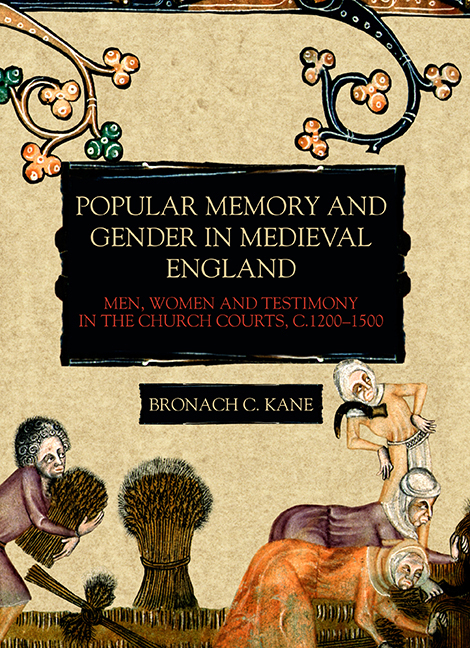 Popular Memory and Gender in Medieval England
Popular Memory and Gender in Medieval England Book contents
- Frontmatter
- Dedication
- CONTENTS
- List of Abbreviations
- Introduction
- Chapter 1 Pastoral Care, Canon Law, and Social Relations
- Chapter 2 Gender, Narrative, and Testimony
- Chapter 3 Bodily Practices
- Chapter 4 Sexuality and Generation
- Chapter 5 Marriage, Kinship, and Widowhood
- Chapter 6 Orality, Written Memory, and Custom
- Chapter 7 Place, Landscape, and Gender
- Conclusion
- Bibliography
- Acknowledgements
- Index
- Gender in the Middle Ages
Chapter 5 - Marriage, Kinship, and Widowhood
Published online by Cambridge University Press: 03 September 2019
- Frontmatter
- Dedication
- CONTENTS
- List of Abbreviations
- Introduction
- Chapter 1 Pastoral Care, Canon Law, and Social Relations
- Chapter 2 Gender, Narrative, and Testimony
- Chapter 3 Bodily Practices
- Chapter 4 Sexuality and Generation
- Chapter 5 Marriage, Kinship, and Widowhood
- Chapter 6 Orality, Written Memory, and Custom
- Chapter 7 Place, Landscape, and Gender
- Conclusion
- Bibliography
- Acknowledgements
- Index
- Gender in the Middle Ages
Summary
In the preface to his Polychronicon, Ranulph Higden observed that ‘shortness of life, dullness of perception, numbness of the soul, weakness of memory and fruitless occupations prevent us from knowing many things, and forgetfulness is ever the stepmother and enemy of memory’. The capacity to remember was thus described through discourses of gender and kinship, emphasising the significant yet precarious role of women in preserving family memory. Higden's highly popular fourteenth-century history found its principal audience in the clergy and religious, with a smaller lay readership among the aristocracy and gentry. By the late fourteenth century, John Trevisa's vernacular translation of the Polychronicon widened its circulation among the mercantile and bourgeois classes, with a prologue that once more described ‘forȝetingnes’ as the ‘craft of a stepdamme’. The figurative alignment of stepmothers with the neglect of memory, while its preservation was associated with motherhood, not only embodied the concerns of lay elites, but also referenced wider social attitudes and fears of memorial rupture after widowhood.
This perceived role of female kin as guardians of memory emerged from the correlation of remembrance with practices deemed to be feminine. Mothers were characterized as responsible for the socialization of children and the everyday household, and this association extended to female relatives who were regarded as carers for the sick and dying, and as accountable for the commemoration of late husbands and other male kin. Yet perceptions of female remembrance did not always reflect the relationship between gender and memory in social practice. The mental categories that organized memorial roles were both socially constructed and ideological, influenced by gendered attitudes that shaped the maintenance of family history. The depiction of kin-group memory as feminine, for instance, embodied assumptions about gendered roles, the nature of unwritten memory, and the operation of the patriarchal household, while simultaneously occluding the contributions of husbands and fathers in the transmission of these histories. Male kin from gentry and aristocratic stock were intimately involved in the preservation of family memory through written histories, often relying on heraldic conventions to preserve their genealogies. Oral accounts of births, marriages, and bonds of kinship circulated among men and women at every social level. There were, nevertheless, profound differences in the way that gender influenced family memory, from the circulation of knowledge about ancestry to gendered perceptions of kinship, and from the organisation of family histories to encounters with the law.
- Type
- Chapter
- Information
- Popular Memory and Gender in Medieval EnglandMen, Women, and Testimony in the Church Courts, c.1200–1500, pp. 137 - 170Publisher: Boydell & BrewerPrint publication year: 2019


